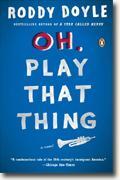Oh, Play That Thing
Roddy Doyle
book reviews:
· general fiction
· chick lit/romance
· sci-fi/fantasy
· graphic novels
· nonfiction
· audio books
· author interviews
· children's books @
curledupkids.com
· DVD reviews @
curledupdvd.com
newsletter
win books
buy online
links
home
for authors
& publishers
for reviewers

 |
Oh, Play That Thing Roddy Doyle Penguin Paperback 384 pages October 2005 |
|
Ask any actor or actress what their worst fear in the industry would be, and a lot of the time the word “typecasting” will come up. You know, the fear that you’ll be forever associated with a particular character or show and are unable to convince an audience you can be anything else. Jean Claude van Damme, for example - or A.L.F.! This affliction can also affect authors. Although an author often sticks to a familiar theme in most of his or her books, they can express their individuality through differing characters and themes. Unfortunately for Roddy Doyle, he has been infected by a particular strain of the typecasting virus called “The Barrytown Syndrome.”
Regrettably, since then he has found the transition out of the Dublin suburb more difficult. His latest offering represents the second part of his Final Roundup trilogy. Following A Star Called Henry, we continue the journey of ex-IRA freedom fighter Henry Smart as he arrives in the U.S. on the run from his past misdemeanors, when he gained legendary status as a Fenian hitman in the War of Independence and Easter Rising in Ireland. His arrival in New York necessitates a complete change in outlook for Henry, who turns his attention to bootlegging, scamming and robbing in order to survive. This inevitably leads to contact and conflict with assorted local hardmen and con merchants whose territory he has infiltrated. Unsurprisingly, taking none too kindly to this, Henry gets run out of town by the mob, lucky to escape with his life, and ends up in Chicago to try his luck again. It is here that he finds an untapped love for all things jazz and gains the acquaintance of a young Louis Armstrong, who as yet is only halfway up the ladder to jazz greatness. The two men soon realize their mutual friendship could be beneficial to both – Henry getting inside information on the local scene from Louis, handy for any would be scams and cons, and Louis, impeded in his aims in 1920s Chicago by the color of his skin, now getting a white sidekick who can get him into places and meetings that were previously impossible. Cue a multitude of japes and scrapes. The setting of this book,as a work of fiction on the main character against a backdrop of historical fact represented by Louis, is rarely a success. Although readers know a work of fiction is exactly that, when immersed in the book the story is very real in the mind. The use of a historical character here only serves to remind the reader that the whole thing really is pie in the sky. But if that were the only problem with Oh, Play that Thing, it could be forgiven. The worst aspect here is, however, that the book is just badly written, both from a literary and a narrative point of view. Paragraphs like this are indicative: “He couldn’t get a gig. There was a cold spell in 1928 when the world’s greatest musician had no place to play. He could front a band, like no one else could, but he couldn’t lead. They wouldn’t let him, and he didn’t know how. He could give the band his name, make it great and famous, but he’d never be the boss. He commanded the stage, but he couldn’t make his own way up there. He needed a manager, but he didn’t want one”.The staccato style works well only when each line has meaning, and too often in this book there are hollow, throwaway lines, such as the above. Doyle’s writing has always carried an undercurrent of warmth in it, especially in the Barrytown trilogy, which you just don’t feel in this book. Sure, it has action, pace and quick one-liners, but I could’ve gotten that in a lot less time in a Jean Claude Van Damme movie. Originally published on Curled Up With A Good Book at www.curledup.com. © Jerry O'Connell, 2006 |
| Also by Roddy Doyle: |
|
|
|
 Click here to learn more about this month's sponsor! |
|
| fiction · sf/f · comic books · nonfiction · audio newsletter · free book contest · buy books online review index · links · · authors & publishers reviewers |
|
| site by ELBO Computing Resources, Inc. | |
 It was the Barrytown trilogy (The Commitments, The Snapper and The Van) that announced Doyle’s arrival on the literary scene with a loud fanfare and ticker-tape parade. These books were widely acclaimed for their cutting wit, everyday characters and their simple yet meaningful storylines. Doyle’s writing style complemented these perfectly, resulting in three highly enjoyable reads - and all three were turned into motion pictures with a fairly high degree of success. He followed this up with probably his best work to date, the Booker Prize-winning M=Paddy Clarke Ha Ha Ha, again set in Barrytown but with a new cast and fresh storyline.
It was the Barrytown trilogy (The Commitments, The Snapper and The Van) that announced Doyle’s arrival on the literary scene with a loud fanfare and ticker-tape parade. These books were widely acclaimed for their cutting wit, everyday characters and their simple yet meaningful storylines. Doyle’s writing style complemented these perfectly, resulting in three highly enjoyable reads - and all three were turned into motion pictures with a fairly high degree of success. He followed this up with probably his best work to date, the Booker Prize-winning M=Paddy Clarke Ha Ha Ha, again set in Barrytown but with a new cast and fresh storyline.